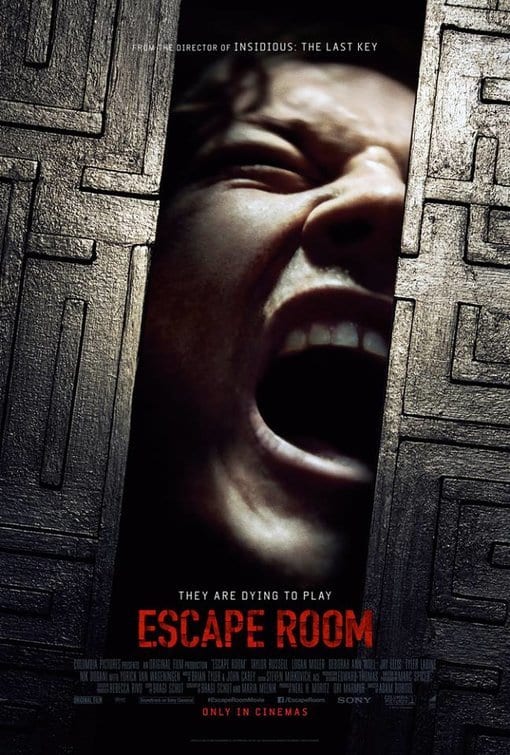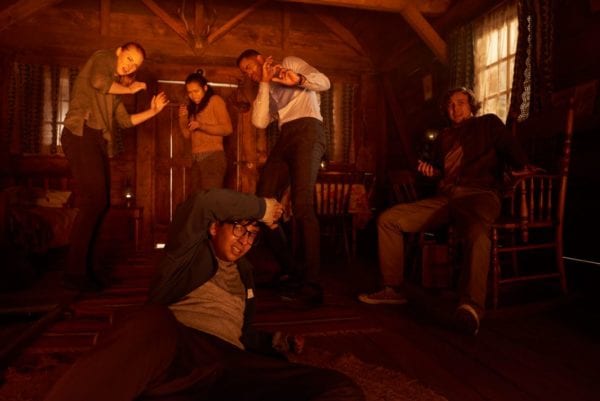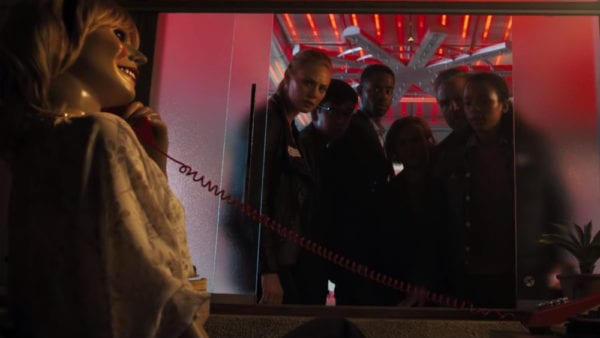Red Stewart chats with Adam Robitel about Escape Room….
Adam Robitel is an American filmmaker who has been working in the film industry since the mid-2000s. He is best known for his projects The Taking of Deborah Logan and Insidious: The Last Key. His latest film is the thriller Escape Room, which is set to be released in the UK on February 1st. Flickering Myth had the privilege to interview him, and I in turn had the honor to conduct it:
I read on your IMDB biography that, in addition to production, you majored in acting, and you’ve had some small acting roles over the years. I’m wondering, has that major and education impacted your directing style when it comes to getting performances and telling your cast what to do?
I always approach everything, whether I’m writing or getting the vibe of the set, from the perspective of the actors, because they’re the ones who are really putting the magic up on the screen. And mostly, it’s about how I interact with actors in terms of intention and just speaking their language: understanding that they all have their own process. And for me, it’s those first couple of days where you’re rehearsing and stuff, trying to figure out what each actor needs. Because they’re all different, and some of them might require a bit of a coach, others need more freedom and some of them need hand-holding.
And I think, if anything, my acting studies and training helps with the writing aspect of it too, because a lot of screenwriters don’t have the experience of subtext. And I tell all my writer friends to take an acting class since it truly teaches you about intention and goal and how to say more with less. So yeah, I think it all feeds itself.
No, that’s definitely interesting to hear, and I’ve heard about different professions spilling into one another, but it’s nice to see that it’s actually formed a strong part of your approach and your career in general.
I was a little schizophrenic. I mean, my trajectory was weird. I wasn’t a great auditioner and I would get very nervous. And it’s ironic because I love acting, I just hated trying to get the job frankly, like many of us.
[Laughs]
You have to have incredibly thick skin, and you’re either wired to be of service to the audition or not. I was, you know, struggling and not making any money, so I switched gears into editing. And editing was interestingly great proving grounds for directing because you really learn how to tell a scene and see what you don’t necessarily need. So it all does feed each other in a cool, kind of closed loop. And so, on the day when I’m directing, I know “oh, I don’t need that, I don’t need to shoot them walking into the building if I’m just going to cut right to this close-up of the keys going down” so to speak. And it’s great in that sense.
That’s definitely fascinating to learn about. You talked about working with less, and Escape Room, alongside your previous movies, was made on a relatively low production budget. Obviously there are problems that come with not having enough money, but what are some benefits you’ve found as a filmmaker with this limit?
Yeah, my first film, The Taking of Deborah Logan, was a found footage medical documentary, turned possession movie. And I pitched that idea because I knew that I could make it for a certain price, and I could do it in 20 days and we could be more sort of run-and-gun. So you always want more money, but at the end of the day it really depends on the project right? With Escape Room, it was very limited resources. And I think what’s happening now unfortunately is, because Jason Blum has been so successful with some of these small films, all the genre movies are being capped at a certain price; unless you’re doing something like It where you have this huge IP and they’re willing to spend a lot. I think, in that respect, we’re always challenged.
But it does make you be more resourceful, and it makes you really think about, getting back to your question, what you truly need- is this scene moving the story forward or am I spending money on a big car chase that does nothing but waste time? In that aspect it’s great, but it’s always a challenge. You never feel like you have enough, you never feel like you have enough time. And for a movie like Escape Room, you need those big trailer moments to get people excited. It’s not a shock movie, it’s a tensious and a suspenseful film, and so I was very adamant that we needed things like an ice room with this really cool vista; that we needed to pull back and show that [the characters] were standing on a ceiling. And those things were important.
I will say, when you do a smaller movie, you’re more in control. I got to do what I wanted to do on my first film, and there were very few interferences. And so it’s a blessing and a curse- the bigger the sandbox you get, the more trappings that come with it. But 20 days is hard. I tell my friends who are getting their first movies going, you have to be shooting sometimes 7-8 pages a day, two set-ups maybe at best. And I always say choose a material that will be more performance-based. Cause there was this gag that we did in [Insidious: The Last Key] that we ended up cutting out, which was like Lin Shaye walking over to open a door, and there’s a demon that causes her to fly across the room. And it seems like, on paper, a simple stunt, but that can take half of your shooting day to do, and to get the rigs in. So it’s easy to write stuff on the page that seems cool and simple, but the reality is it’s always going to take twice as long as you think [laughs].
So therein lies the rub. First movies should be more in-camera, more performance-based. And then you start to graduate up. But yeah, having all the money in the world doesn’t help if the material isn’t good, and that’s the big through-line of my answer is it’s about the material. If you have a great script, everything else can build on that. If you don’t, and it’s just vacuous and empty-sort of pages, then all the money in the world isn’t going to make it suddenly human and acceptable.
No, and that ties back to your earlier point about every skill-set being connected. My last question sir, you talked about how established IPs like It: Chapter One have it easier in the industry. And I saw the trailer, which was really well done- those trailer moments you were talking about were great and definitely made me want to see the movie. But I was disappointed to read the comments, which kept comparing it to the Saw franchise, which I didn’t see at all outside of maybe the booby traps. I’m curious, though, how challenging is it, in this day and age, to defy audience expectations when it does seem like every story has been told already?
Yeah, I mean look, I think comparing to Saw is fine, but ultimately the movie is it’s own thing, and we’re hoping that word-of-mouth will separate it. At the end of the day, we’re not relying on torture devices and reverse-bear traps and so forth. It’s like we’re honored to be included in that, and that’s okay.
To answer your question, you want to give audiences something familiar but with a new spin. Unfortunately, if it’s too avante-garde, then it’s not going to translate to middle America and internationally and stuff. So you kind of have to wrap it into a cool package that feels knowable, but then is, hopefully, executed in a way that makes it feel fresh. And with Escape Room, it’s a Ten Little Indians movie that’s been around since Agatha Christie, but it has this new idea which is that the state itself is a villain and the room itself is a massive puzzle that’s constantly changing. And it pushes the envelope in terms of the set pieces.
But yeah, I saw one person was like “oh, it’s like a cheaper Saw.” It’s like, have you seen Saw? [laughs]. But look, I try not to read the comments; you let the movie speak for itself.
No absolutely, and I am actively looking forward to it. Thank you sir so much for speaking with me. I think you’re a talented rising star, and I’m looking forward to what you do after Escape Room as well.
You’re very very kind, thank you!
SEE ALSO: Read our Escape Room review here
Flickering Myth would like to thank Mr. Robitel for sitting down with us. Special thanks to Sony Pictures for making this interview possible.
Escape Room is out in the UK on February 1st.
Red Stewart















